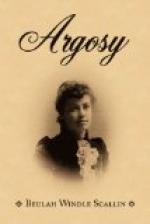He touched but lightly upon it now. His tones were low, his words when he began somewhat confused: nevertheless his wife, gazing up at him with her large dark eyes, gathered an inkling of his meaning.
“Don’t tell it me!” she passionately interrupted. “Do not tell me that I am only your second wife.”
He went over to her, praying her to be calm, speaking of the bitter feeling of shame which had ever since clung to him.
“Did you divorce her?”
“No, no; you do not understand me, Eliza. She died before anything could be done; the ship was wrecked.”
“Were there any children?” she asked in a hard whisper.
“One; a baby of a year old. He was drowned with his mother.”
Mrs. Hamlyn folded her hands one over the other, and leaned back in her chair. “Why did you deceive me?”
“My will was good to deceive you for ever,” he confessed with emotion. “I hate that past episode in my life; hate to think of it: I wish I could blot it out of remembrance. But for Pratt I should not have told you now.”
“Oh, he said you ought to tell me?”
“He did: and blamed me for not having told you already.”
“Have you any more secrets of the past that you are keeping from me?”
“None. Not one. You may take my honour upon it, Eliza. And now let us—”
She had started forward in her chair; a red flush darkening her pale cheeks, “Philip! Philip! am I legally married? Did you describe yourself as a bachelor in the license?”
“No, as a widower. I got the license in London, you know.”
“And no one read it?”
“No one save he who married us: Robert Grame, and I don’t suppose he noticed it.”
Robert Grame! The flush on Eliza’s cheeks grew deeper.
“Did you love her?”
“I suppose I thought so when I married her. It did not take long to disenchant me,” he added with a harsh laugh.
“What was her Christian name?”
“Dolly. Dora, I believe, by register. My dear wife, I have told you all. In compassion to me let us drop the subject, now and for ever.”
Was Eliza Hamlyn—sitting there with pale, compressed lips, sullen eyes, and hands interlocked in pain—already beginning to reap the fruit she had sown as Eliza Monk by her rebellious marriage? Perhaps so. But not as she would have to reap it later on.
Mr. and Mrs. Hamlyn spent nearly all that year in travelling. In September they came to Peacock’s Range, taking it furnished for a term of old Mr. and Mrs. Peveril, who had not yet come back to it. It stood midway, as may be remembered, between Church Leet and Church Dykely, so that Eliza was close to her old home. Late in October a little boy was born: it would be hard to say which was the prouder of him, Philip Hamlyn or his wife.
“What would you like his name to be?” Philip asked her one day.




